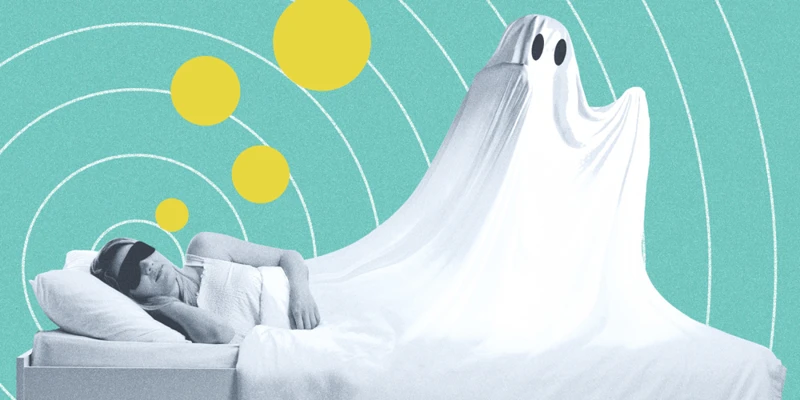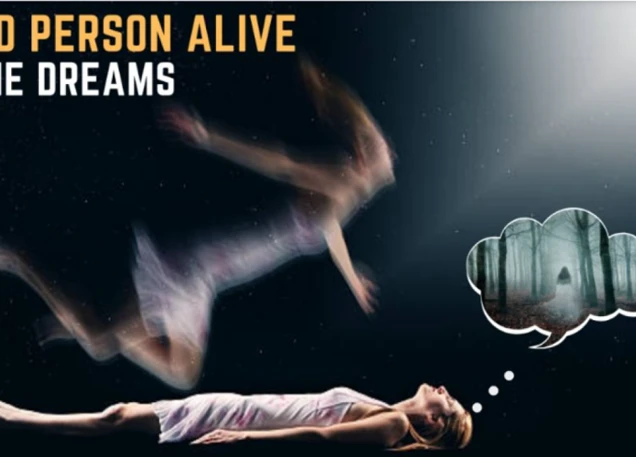Exploring the Meaning of Dreaming of Someone Who is Already Dead: Dreams have long fascinated and mystified humans, as they unlock a realm where the boundaries of reality fade away. One intriguing aspect of dreams is the occurrence of vivid visions involving individuals who have passed away. These dreams can be both puzzling and comforting, leaving us questioning the significance behind such encounters. What do these dreams mean? Are they merely random events or do they hold deeper meanings? In this article, we will delve into the profound and enigmatic nature of dreaming of someone who is already dead, deciphering the possible symbolism, emotional closure, communication, and reflections they may offer. Let us embark on this exploration of the dream world, where the realms of the living and the departed intertwine.
Significance of Dreaming of Someone Who is Already Dead

The significance of dreaming of someone who is already dead can be attributed to various factors, each offering a unique perspective on the dream experience. Let’s explore these aspects in detail:
Dreams often serve as a gateway to the unconscious mind, where symbols and metaphors manifest. When we dream of someone who has passed away, it may represent unresolved emotions or unfinished business related to that individual. It could be a symbol of closure or a reminder of the impact they had on our lives.
Dreaming of a deceased loved one can be a way for our subconscious mind to facilitate emotional closure and healing. These dreams may provide an opportunity to say goodbye, seek forgiveness, or express unresolved feelings. They can be a form of catharsis, allowing us to process grief and find solace in our dreams.
Some individuals believe that dreams of the deceased are a form of communication from the afterlife. These dreams may contain messages, guidance, or even visits from the departed. While it is subjective and based on personal beliefs, these dreams can offer a sense of connection and reassurance to those who experience them.
Dreams of deceased individuals could also serve as a reflection of past relationships and the impact they had on our lives. These dreams may bring back fond memories, unresolved conflicts, or lessons learned from those who are no longer with us. They allow us to reminisce, appreciate, and reflect on the significance of the bond shared.
Understanding the significance of dreaming of someone who is already dead requires a multifaceted approach, considering each individual’s unique experiences and beliefs. It is important to explore the various interpretations and introspect on the personal significance that these dreams hold. Let’s now delve into common scenarios that occur in dreams involving deceased individuals.
1. Unconscious Mind Symbolism
When dreaming of someone who is already dead, the symbolism generated by the unconscious mind can provide valuable insights. Our dreams often work in metaphorical ways, using symbols and imagery to represent deeper emotions and unresolved issues. It is crucial to analyze the specific symbols present in the dream to uncover their hidden meaning. For example, if the deceased individual appears as a guiding figure in the dream, it may indicate that the dreamer is seeking guidance or support in their waking life. Similarly, if the dream involves a peaceful reunion with the departed, it could symbolize a sense of closure and acceptance. Each symbol holds its own significance, and analyzing them in conjunction with personal experiences and emotions can help unravel the message conveyed by the unconscious mind. By paying attention to these symbols, we gain a greater understanding of ourselves and the intricate workings of our dreams. For a deeper exploration of dream symbolism, you can read more about the meaning of dreaming of a dog dying or the symbolism of clouds in dreams.
2. Emotional Closure and Healing
Emotional closure and healing are significant aspects of dreaming of someone who is already dead. These dreams can provide a unique opportunity to process grief, seek forgiveness, and find solace. Here are a few key points to consider:
1. Resolution of Unresolved Emotions: Dreams of deceased individuals allow our subconscious mind to address unresolved emotions associated with the relationship. It can be a way to express our feelings, whether it’s love, anger, guilt, or sadness. Through these dreams, we may have the chance to confront and ultimately find emotional closure.
2. Seeking Forgiveness: Dreaming of someone who has passed away can present an opportunity for us to seek forgiveness or grant forgiveness to the departed. These dreams may provide a space where we can let go of any lingering guilt or remorse and find peace within ourselves. It is a chance to reconcile and heal emotional wounds.
3. Processing Grief: Dreams offer a pathway for us to process and navigate the complex emotions associated with grief. They can provide a safe environment to experience and release sorrow, allowing us to move forward in our healing journey.
4. Finding Comfort and Solace: Dreams of the deceased can bring a sense of comfort and solace, especially during times when we miss them the most. These dreams may serve as a reminder that they are still with us in some form and that their love and presence continue to exist even after death.
Dreams of deceased individuals hold immense potential for emotional closure and healing. They offer a space for us to address unresolved emotions, seek forgiveness, process grief, and find comfort. Let’s further explore the different scenarios that can occur in dreams involving the departed.
3. Communication from the Beyond
Dreaming of someone who is already dead can occasionally be seen as a form of communication from the beyond. Some individuals believe that these dreams provide a means for the departed to reach out to us, offering guidance, messages, or comfort. While skeptics may dismiss these experiences as mere figments of the imagination, those who have had such dreams often find them profoundly meaningful. These dreams may contain symbolic elements, surreal interactions, or vivid conversations that leave a lasting impression on the dreamer. Whether it’s a gentle presence, a voice of wisdom, or a sense of closure, the idea of connecting with someone from the afterlife through dreams can bring solace and a sense of connection. It is indeed a fascinating and personal aspect of dreaming that can inspire contemplation about the supernatural and the possible realms beyond our waking lives.dream-of-going-on-a-date
4. Reflection of Past Relationships
Dreams that involve deceased individuals often serve as a reflection of past relationships. When we dream of someone who has already passed away, it can evoke memories and emotions associated with that person. These dreams can bring back moments of joy, love, and connection, but they can also resurface unresolved conflicts or regrets. The presence of a deceased loved one in a dream can symbolize the impact they had on our lives, the lessons we learned from them, and the significance of the bond we shared. It provides an opportunity for us to reflect on the relationship, appreciate the memories, and perhaps seek closure for any unfinished business. These dreams can be a form of emotional processing and can offer a space for healing and growth.
Common Scenarios in Dreaming of Deceased Individuals

Dreams of deceased individuals can manifest in various scenarios, each offering a unique glimpse into the dreamer’s psyche. Let’s explore some common scenarios that occur in dreams involving deceased individuals:
1. Conversing with the Departed: In these dreams, the dreamer may engage in meaningful conversations with the deceased individual. These interactions can provide a sense of comfort, closure, or even guidance.
2. Receiving Guidance or Messages: Dreams of the deceased can sometimes involve receiving guidance or messages from them. These dreams may include important advice, warnings, or reassurances that the dreamer needs in their waking life.
3. Witnessing the Deceased Alive: In these dreams, the deceased individual appears alive, as if they never passed away. Such dreams can evoke a sense of joy, nostalgia, or confusion, as the dreamer experiences a reality where the departed is still present.
4. Attending a Funeral or Cemetery: Dreaming of a deceased individual can involve scenarios where the dreamer attends a funeral or visits a cemetery. These dreams may symbolize the need to mourn, remember, or honor the departed, or they could represent a desire to let go of grief and move forward.
These common scenarios in dreams of deceased individuals offer intriguing insights into the dream world and the relationship between the dreamer and the departed. Now, let’s explore how different factors can influence the interpretation of these dreams.
1. Conversing with the Departed
Conversing with the departed is a common scenario in dreams of deceased individuals. In these dreams, you may find yourself engaged in conversations with the person who has passed away. These conversations can be deeply emotional and meaningful, providing a sense of connection and closure. The content of these conversations can vary, ranging from lighthearted exchanges to discussions of unresolved issues or messages from the beyond. It is important to pay attention to the emotions and messages conveyed during these dream conversations, as they may hold deeper significance for your healing and personal growth. Remember to keep an open mind and reflect on the potential insights and insights these dream dialogues may offer.
2. Receiving Guidance or Messages
Dreaming of receiving guidance or messages from someone who is already dead is a fascinating aspect of dreaming. In these dreams, the deceased individual may communicate important information, offer advice, or provide guidance for current situations or future endeavors. The messages can come in various forms, such as verbal communication, symbolic gestures, or intuitive knowledge. These dreams may provide a sense of comfort, reassurance, or direction for those who experience them. While the interpretation of these messages is subjective and deeply personal, it is essential to pay attention to the emotions, symbols, and context within the dream to gain a deeper understanding of the guidance being received. These dreams can foster a sense of connection to the departed and offer solace in knowing there is continued support from beyond the physical realm.
3. Witnessing the Deceased Alive
In dreams, witnessing the deceased person alive can be a perplexing yet intriguing experience. This scenario often elicits mixed emotions and can leave one questioning its meaning. There are several possible interpretations for dreaming of seeing a deceased individual alive:
1. Symbol of Resilience: Seeing the deceased person alive in a dream may symbolize resilience and the ability to overcome difficult situations. It could represent the inner strength and resilience within oneself or serve as a reminder of the person’s lasting impact on one’s life.
2. Unresolved Feelings: Dreams of a deceased person being alive can also indicate unresolved emotions or unfinished business related to that individual. It may be a signal to address any lingering feelings or unresolved issues associated with the person, as the dream presents an opportunity for closure.
3. Subconscious Wish Fulfillment: Sometimes, dreaming of a deceased person alive can be a manifestation of a deep longing or a subconscious desire to have the person back in one’s life. These dreams might occur during times of grief, nostalgia, or significant life changes.
4. Symbolic Transformation: Dreams of a deceased person being alive might represent a symbolic transformation or the evolution of one’s own identity. It could symbolize personal growth, the integration of past experiences, or the continuation of the deceased person’s positive qualities within oneself.
It’s important to remember that dream interpretations are highly subjective, and the meaning of witnessing the deceased person alive can vary depending on the individual’s personal experiences, emotions, and beliefs. Exploring the emotions and symbolism surrounding such dreams can offer valuable insight into the significance they hold for the dreamer. Now, let’s move on to the next common scenario in dreaming of deceased individuals.
4. Attending a Funeral or Cemetery
In dreams of attending a funeral or cemetery, the presence of a deceased individual holds significant symbolism. It may represent a need for closure or a reminder to honor and remember the person who has passed away. These dreams can evoke a range of emotions, from sadness and grief to reflection and acceptance. Attending a funeral or cemetery in a dream may also symbolize a transition or letting go of the past. It can signify a desire to move forward or release any lingering attachments to the deceased. These dreams may serve as a reminder of mortality and the impermanence of life. They prompt us to contemplate our own mortality and reflect on the importance of cherishing our time with loved ones. As we delve deeper into the interpretation of dreams involving the deceased, let’s now explore how different factors can influence the meaning behind these dreams.
Interpreting Different Factors in Dreams of the Deceased

Interpreting dreams of the deceased involves considering different factors that contribute to the overall meaning and symbolism of the dream. Let’s explore these factors to gain a deeper understanding:
1. Relationship with the Deceased: The nature of your relationship with the deceased can impact the interpretation of the dream. Dreams involving family members may hint at unresolved family issues or ancestral connections, while dreaming of friends or acquaintances may reflect unfinished conversations or unresolved emotions.
2. Emotional State during the Dream: The emotions experienced in the dream can offer valuable insights. Feelings of joy and comfort may indicate a sense of closure or reassurance, while emotions such as sadness or fear may signify lingering grief or unresolved issues.
3. Symbols and Surroundings: Pay attention to the symbols and surroundings in the dream. Objects, locations, or specific events can hold symbolic meaning. For example, dreaming of a cemetery may symbolize letting go of the past, while seeing flowers could represent renewal or growth.
4. Personal Beliefs and Cultural Influences: Personal beliefs and cultural influences shape our interpretations of dreams. Different cultures have unique perspectives on death and afterlife, which can influence the significance assigned to dreaming of the deceased. Consider your beliefs and cultural background when deciphering the meaning of these dreams.
By examining these factors in your dreams, you can begin to unravel the hidden messages and insights they hold. However, it’s essential to remember that dream interpretation is subjective and highly personal. The true meaning of these dreams lies within your own understanding and intuition. Let’s now explore the psychological and spiritual perspectives on dreaming of the dead.
1. Relationship with the Deceased
Our relationship with the deceased plays a crucial role in understanding the significance of dreaming about them. The nature of the relationship can determine the emotions, memories, and unresolved issues that are being explored in the dream. If the deceased individual was a close family member or a dear friend, the dream might reflect the depth of our emotions and the impact they had on our lives. Dreams involving estranged relationships could signify the need for reconciliation or closure. The dynamics of the relationship, whether positive or negative, can
Subscribe to Our Newsletter
Sign up to receive the latest news and updates.
2. Emotional State during the Dream
The emotional state experienced during a dream can provide valuable insights into the significance of dreaming of someone who is already dead. Our emotions during these dreams can range from sadness and longing to joy and comfort. The intensity and nature of these emotions can vary, depending on the individual and their relationship with the deceased person. Strong feelings of grief or longing may indicate unresolved emotional attachments or a need for closure. On the other hand, feelings of happiness or peace might suggest a sense of acceptance or a comforting message from the departed individual. It is essential to pay attention to the emotional nuances within these dreams, as they offer clues to our own feelings and emotional processing surrounding the loss.
3. Symbols and Surroundings
When it comes to dreaming of someone who is already dead, paying attention to the symbols and surroundings within the dream can provide valuable insights. Dreams often present themselves in symbolic language, and analyzing these symbols can help decipher their meaning. For example, seeing a clock could signify the passage of time or a missed opportunity, while a mirror might represent self-reflection or introspection. The surroundings in the dream can also hold significance. For instance, dreaming of being in a familiar place associated with the deceased individual may indicate a need for closure or a longing to revisit past memories. Likewise, dreaming of a cemetery or funeral might suggest the need to let go of the past or the desire for spiritual connection. By observing and interpreting these symbols and surroundings, we can gain a deeper understanding of the messages and emotions encoded within our dreams.
4. Personal Beliefs and Cultural Influences
Personal beliefs and cultural influences play a significant role in the interpretation of dreams involving deceased individuals. This aspect recognizes that the meaning of dreaming of someone who is already dead can vary greatly depending on an individual’s beliefs, traditions, and cultural background. For example, some cultures view these dreams as spiritual encounters or manifestations of the afterlife, while others may attribute them to psychological processes or symbolic representations. Personal beliefs and cultural influences shape how individuals understand and interpret their dreams, adding layers of complexity and subjectivity to the overall experience. It is essential to consider these factors when exploring the significance of dreams involving deceased individuals, as they contribute to the diversity of interpretations and perspectives.
Psychological and Spiritual Perspectives on Dreaming of the Dead
When it comes to dreaming of the dead, there are both psychological and spiritual perspectives to consider. Let’s explore these viewpoints:
Psychological Interpretations:
1. From a psychological standpoint, dreaming of the dead can be seen as a way for the subconscious mind to process grief and loss. It allows individuals to confront and come to terms with their emotions surrounding the death of a loved one.
2. Dreams of the deceased may also reflect unresolved issues or unfinished business with the person who has passed away. These dreams provide an opportunity for introspection and reflection, allowing individuals to delve deeper into their own thoughts and feelings.
3. Symbolism plays a significant role in psychological interpretations of dreams. The appearance of a deceased individual in a dream may represent certain personality traits, emotions, or aspects of the dreamer’s subconscious mind that are associated with that person.
Spiritual and Supernatural Interpretations:
1. In spiritual and supernatural beliefs, dreams of the dead can be seen as a form of communication from the spirit world. These dreams are often seen as visitations, where the deceased person is reaching out to provide guidance, support, or messages to the dreamer.
2. Some cultures believe that dreaming of the deceased is a sign of their presence or protection. These dreams are seen as a way for the departed to offer comfort, reassurance, or guidance to the dreamer.
3. Supernatural interpretations view dreams of the dead as glimpses into the afterlife or the spirit realm. These dreams may offer insight into the journey of the soul, the existence of an afterlife, or the continuation of the deceased person’s consciousness.
It is important to note that individuals may interpret dreams differently based on their personal beliefs and cultural backgrounds. The psychological and spiritual perspectives provide different lenses through which to understand the significance of dreaming of the dead. By exploring these perspectives, one can gain a deeper understanding of these profound and mysterious dream experiences.
1. Psychological Interpretations
Psychological interpretations provide insight into the possible meanings behind dreaming of someone who is already dead. These interpretations focus on the inner workings of the mind and the psychological processes that occur during dream states. Here are some key aspects to consider:
1. Symbolism: Dreams often utilize symbolism to represent various aspects of our lives. In the case of dreaming of the deceased, it could symbolize unresolved emotions, memories, or aspects of ourselves that we have laid to rest. The presence of a deceased individual in a dream may represent the need to address these unresolved issues or emotions.
2. Subconscious Processing: Dreams serve as a way for the subconscious mind to process and make sense of daily experiences and emotions. Dreaming of someone who is already dead could be a reflection of how we are dealing with grief, loss, or past relationships. It may be indicative of our subconscious mind’s attempts to come to terms with these emotions or seek resolution.
3. Coping Mechanisms: Dreaming of deceased individuals can serve as a coping mechanism for dealing with grief or trauma. These dreams may offer a way for the mind to process and work through intense emotions, providing a sense of closure or healing. They can also serve as a reminder of the importance of acknowledging and addressing our feelings in both waking life and the dream realm.
4. Unconscious Desires: Dreams often tap into our unconscious desires and wishes. Dreaming of someone who is already dead may stem from a longing for their presence or a desire to connect with them once more. These dreams may provide comfort or a way for the mind to fulfill a need for emotional connection, especially in situations where the relationship with the deceased was significant.
Psychological interpretations offer valuable insights into the complexities of dreaming of someone who is already dead. Exploring these interpretations can help individuals gain a better understanding of their own emotions, experiences, and the ways in which their subconscious mind processes grief and loss.
2. Spiritual and Supernatural Interpretations
When it comes to the interpretation of dreaming of someone who is already dead, some people turn to spiritual and supernatural perspectives. These interpretations believe that these dreams are more than mere reflections of memories or emotions. Instead, they view them as direct encounters or messages from the spiritual realm. Here are a few common spiritual and supernatural interpretations:
1. Visitation: Some individuals believe that dreams of the deceased are actual visitations from their spirits or souls. They see these dreams as opportunities for the departed loved ones to communicate, provide guidance, or offer comfort.
2. Mediumship: Spiritual interpretations may involve the concept of mediumship, where dreams act as a means of communication between the living and the spirit world. These dreams are seen as a way for mediums to connect with the departed.
3. Symbolic Messages: From a supernatural perspective, dreaming of someone who is already dead is seen as receiving symbolic messages. Each symbol or event in the dream is believed to carry a hidden meaning or a message from beyond.
4. Premonitions: Some individuals interpret dreams of the deceased as premonitions or insights into future events. These dreams are seen as warnings or guidance from the spiritual realm.
It’s important to note that these interpretations rely heavily on personal beliefs and spirituality. While some find solace and meaning in these perspectives, others may approach these dreams from a psychological standpoint. Ultimately, the interpretation of dreams involving deceased individuals is subjective, and individuals should explore what resonates with them personally.
Conclusion
In conclusion, dreaming of someone who is already dead holds significant meaning that can vary from person to person. These dreams can be seen as the subconscious mind’s way of processing unresolved emotions, seeking closure and healing, or even providing a sense of communication from beyond. They can also serve as reflections of past relationships and the impact they had on our lives. Interpreting these dreams requires considering individual experiences, beliefs, and the specific context of the dream. Whether seen as psychological or spiritual, dreams of the deceased offer us a profound glimpse into the intricate workings of our subconscious and the connections we hold with those who have passed on. Embracing these dreams as opportunities for introspection and understanding helps us navigate the complex tapestry of our minds and emotions.
Frequently Asked Questions
1. Can dreaming of someone who is already dead be a sign of their presence in our lives?
While some interpret such dreams as a spiritual or supernatural connection, it is subjective and dependent on personal beliefs. Dreaming of deceased loved ones can provide a sense of comfort and connection, but whether it indicates their actual presence is open to interpretation.
2. Why do dreams of deceased individuals often feel so vivid and real?
Dreams involving deceased individuals can feel exceptionally vivid due to the strong emotional connections we had with them during their lifetime. Our subconscious mind may create intense and realistic dream scenarios to evoke powerful emotions and facilitate healing or closure.
3. Are there cultural or religious significances attached to dreaming of the dead?
Yes, cultural and religious beliefs play a significant role in interpreting dreams about the deceased. Different cultures and religions have their own interpretations, ranging from seeing these dreams as visitations from the afterlife to viewing them as symbolic representations of unresolved emotions or unfinished business.
4. What if I have recurring dreams about someone who has passed away?
Recurring dreams about the deceased could signify that there are unresolved emotions, guilt, or unfinished business associated with that person. It may be helpful to explore these feelings and seek closure or seek support through therapy or grief counseling.
5. Can dreams of deceased individuals provide guidance or messages?
Some people believe that dreams involving the deceased can carry messages or guidance from the spiritual realm. These messages could be symbolic or direct, and it is important to pay attention to the emotions, symbols, and overall context of the dream to interpret any potential messages.
6. Is it common to dream of deceased individuals during times of grief?
Yes, it is not uncommon to dream of deceased individuals during periods of grief. These dreams can serve as a way for the subconscious mind to process and come to terms with loss, providing a space for healing and closure.
7. What can I do to better understand the meaning and significance of my dreams about the deceased?
Keeping a dream journal can help you identify patterns, symbols, and emotions associated with dreams of the deceased. Additionally, seeking guidance from therapists, dream analysts, or individuals with expertise in spiritual or cultural beliefs can provide valuable insights into interpreting dream experiences.
8. Is it possible to control or influence dreams involving deceased individuals?
While it is generally not possible to control or influence specific dreams, you can create a conducive environment for dream recall and lucidity by maintaining a consistent sleep schedule, practicing relaxation techniques before bed, and setting intentions to dream of specific individuals or themes.
9. Can dreams of the deceased bring closure or help in the grieving process?
Yes, dreams of deceased individuals can aid in the healing and grieving process by allowing for emotional release, providing an opportunity to say goodbye or seek closure, and offering a sense of connection and reassurance. However, individual experiences may vary.
10. Are dreams of the deceased always positive and comforting?
No, dreams of deceased individuals can vary in their emotional tone and content. While they often bring comfort and closure, they can also evoke unresolved conflicts, unprocessed grief, or even feelings of fear or sadness. The interpretation of these dreams depends on the specific context and emotions involved.










